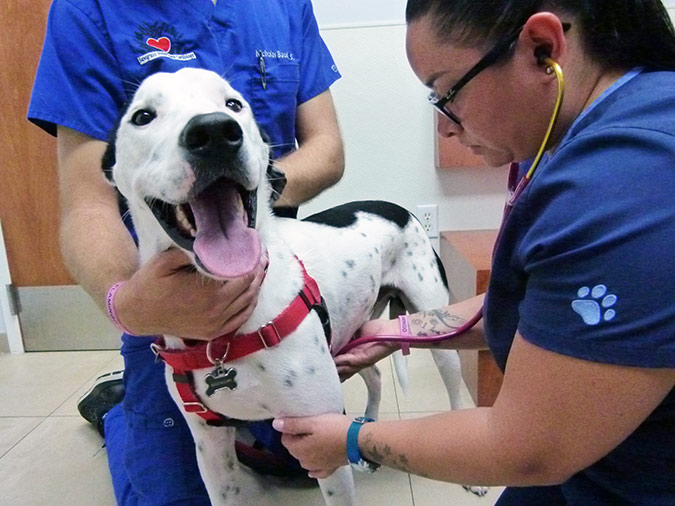Exploring the Vital Services Offered by a Veterinary Cardiologist: Recognizing Ultrasound and CT Scan Techniques
Vet cardiologists play an essential duty in the wellness of pets by diagnosing and treating different heart disease. They make use of innovative imaging methods, such as heart ultrasound and CT scans, to give exact examinations. Each technique has its distinct benefits and applications. Comprehending these methods is necessary for pet dog proprietors seeking the very best care for their buddies. What elements should pet dog owners take into consideration when selecting between these diagnostic tools?

The Duty of Veterinary Cardiologists in Pet Dog Medical Care
Veterinary cardiologists play a vital role in the medical care of family pets, focusing specifically on identifying and treating heart-related problems. They have specialized training that permits them to analyze intricate analysis examinations and determine different cardiovascular problems. These professionals make use of sophisticated strategies, such as echocardiography and electrocardiography, to evaluate heart feature and framework accurately.Veterinary cardiologists likewise establish tailored therapy strategies that might consist of medications, lifestyle alterations, and, in many cases, surgical treatments. Their experience encompasses informing pet proprietors concerning heart health and wellness, highlighting the value of routine exams and early detection of prospective troubles. Partnership with basic vets is important, as it ensures comprehensive look after pets with believed heart issues. By using specialized services, vet cardiologists considerably improve the quality of life for pet dogs and provide peace of mind for their proprietors, strengthening the value of heart health and wellness in general pet dog health.
Usual Cardiac Problems in Family Pets
Common heart issues in animals can substantially impact their health and wellness and quality of life. Heart whisperings, numerous kinds of cardiomyopathy, and congenital heart flaws are amongst one of the most prevalent conditions that veterinarians run into. Ultrasound For Dogs. Recognizing these problems is vital for family pet proprietors to assure timely diagnosis and ideal therapy
Heart Murmurs in Pets
Heart whisperings can be a source of problem for animal proprietors, they are not constantly a measure of severe wellness problems. A heart murmur is an abnormal audio produced by turbulent blood circulation within the heart. In family pets, these murmurs can be triggered by various aspects, including congenital heart problems, valve problems, or perhaps stress and anxiety throughout evaluations. Several pets with heart murmurs lead regular lives without significant wellness impacts. To identify the underlying cause, veterinary cardiologists commonly utilize diagnostic techniques such as echocardiograms and Doppler ultrasounds. Early discovery and assessment are crucial, as they might help manage any kind of prospective cardiac problems properly. Family pet owners are encouraged to consult their vet for an extensive examination if a heart murmur is detected.
Cardiomyopathy Types Explained
Cardiomyopathy incorporates a group of illness influencing the heart muscular tissue, resulting in compromised cardiac function in family pets. One of the most common types include dilated cardiomyopathy (DCM), hypertrophic cardiomyopathy (HCM), and restrictive cardiomyopathy (RCM) DCM primarily influences pets, triggering the heart to increase the size of and deteriorate, which decreases its capability to pump blood successfully. On the other hand, HCM is much more common in pet cats, characterized by the thickening of the heart walls, commonly leading to obstructed blood circulation. RCM, though less common, takes place when the heart muscle mass ends up being stiff, limiting its capacity to loaded with blood. Each type offers special obstacles in diagnosis and therapy, demanding specialized vet cardiological assessment to ensure peak monitoring and treatment for affected family pets.
Congenital Heart Problems
Hereditary heart defects stand for a considerable category of cardiac issues in pet dogs, distinct from obtained conditions such as cardiomyopathy - CT Scans For Dogs. These flaws are structural abnormalities present at birth, affecting the heart's typical feature. Typical kinds include license ductus arteriosus, ventricular septal flaws, and pulmonic constriction. Signs might differ widely, ranging from moderate to severe, and can include workout intolerance, coughing, and trouble breathing. Early medical diagnosis with advanced imaging methods like ultrasound is important for effective monitoring. Vet cardiologists play an essential duty in determining these conditions and advising appropriate treatment choices, which might consist of clinical monitoring or medical intervention. Acknowledging genetic heart issues enables better outcomes and improved lifestyle for affected pets
Understanding Cardiac Ultrasound: How It Functions
A substantial number of veterinary methods now utilize cardiac ultrasound as a crucial analysis device for evaluating heart health in animals. This non-invasive technique utilizes high-frequency acoustic waves to create photos of the heart's structure and function. During the treatment, a vet service technician uses a gel to the pet's breast and utilizes a transducer to send out ultrasound waves. These waves jump off the heart and bordering frameworks, producing real-time pictures on a monitor.Veterinarians can evaluate numerous aspects of cardiac health and wellness, including chamber dimension, wall surface movement, and shutoff feature. Additionally, heart ultrasound permits the discovery of abnormalities such as fluid accumulation and congenital heart issues. This method is crucial for identifying conditions that may not show up with conventional radiographs. By offering comprehensive information concerning the heart's composition and performance, cardiac ultrasound aids in creating efficient treatment prepare for animals enduring from heart disease.
The Importance of CT Scans in Diagnosing Heart Issues
How do CT scans improve the medical diagnosis of heart disease in veterinary medication? CT scans supply comprehensive cross-sectional pictures of the heart and bordering frameworks, allowing veterinarians to picture complex physiological connections. This imaging strategy is especially advantageous in recognizing hereditary heart defects, cardiac tumors, and irregularities in blood vessels. By using advanced imaging formulas, CT scans can assess visit heart chamber sizes and feature, providing a comprehensive sight that may be tough to achieve with standard methods.Additionally, CT angiography can visualize blood circulation and recognize areas of constriction or obstruction, which is crucial for preparing possible interventions. The rate and accuracy of CT scans also assist in quick medical diagnoses, vital in emergency scenarios. Inevitably, the unification of CT scans into vet cardiology greatly improves the precision of diagnoses, enabling targeted therapy strategies and boosting client results for pets dealing with heart disease.
Comparing Ultrasound and CT Check Strategies
While both ultrasound and CT scans are important devices in vet cardiology, they offer unique advantages and limitations that influence their use in identifying heart disease. Ultrasound, or echocardiography, gives real-time imaging of the heart's structure and function, enabling vets to analyze heart chambers, shutoffs, and blood circulation. It is specifically reliable for evaluating problems like heart disease and cardiomyopathy. However, ultrasound might be restricted in envisioning particular physiological frameworks as a result of patient size or obesity.In contrast, CT checks deal in-depth cross-sectional pictures of the heart and bordering tissues, making them suitable for recognizing architectural problems, lumps, or vascular issues. CT scans give detailed understandings, they call for sedation and may involve radiation direct exposure. Eventually, the choice in between ultrasound and CT scans depends on the details scientific scenario, the person's condition, and the details required for an exact medical diagnosis.
Therapy Choices Available With Veterinary Cardiology
Vet cardiology provides a series of treatment alternatives customized to address different heart conditions in pets. Treatment strategies frequently start with way of life alterations, consisting of diet plan adjustments and exercise modifications, targeted at enhancing total heart health and wellness. Drugs play an important duty, with cardiologists prescribing medicines such as diuretics, beta-blockers, and ACE inhibitors to handle signs and symptoms and enhance heart Cancer Veterinary Near Me function.In more serious cases, interventional procedures, such as balloon valvuloplasty or stent positioning, may be essential to relieve obstructions or boost blood circulation. For particular congenital heart issues, surgical options might be discovered to correct structural issues. Furthermore, recurring monitoring and follow-up care are crucial components of a complete therapy strategy, permitting timely modifications based upon the pet dog's reaction to treatment. Generally, veterinary cardiology concentrates on offering efficient, customized care to enhance the wellness and health of pet patients with heart problems.
Just how to Prepare Your Pet for a Cardiac Examination
Preparing a pet dog for a heart examination is crucial to assure exact outcomes and a smooth procedure. Owners should first schedule the appointment with the vet cardiologist and review any kind of details needs or worries. It is a good idea to keep food for at the very least 12 hours prior to the evaluation, as this helps enhance imaging quality throughout treatments like ultrasound or CT scans.Additionally, preserving a calm environment on the day of the consultation can help in reducing the animal's anxiety. It is beneficial to bring along any pertinent clinical records, consisting of previous examinations and medicines (Ultrasound For Dogs). Proprietors ought to also make particular that their family pet fits and leashed during transportation to the center. Acquainting themselves with the assessment procedure can aid and ease worries in asking educated questions throughout the consultation. By complying with these steps, proprietors can add significantly to the performance of the cardiac analysis
Frequently Asked Inquiries
The length of time Does a Heart Ultrasound or CT Scan Take?
The period of a cardiac ultrasound normally varies from 30 to 60 minutes, while a CT check may take around 15 to 30 minutes. Elements such as the person's condition can influence these time price quotes.

Are There Any Risks Related To These Diagnostic Treatments?

Can I Keep With My Animal Throughout the Procedure?
The veterinary center's plan commonly determines whether animal owners can remain during treatments. While some facilities motivate owner presence for convenience, others may require splitting up to assure safety and security and excellent problems for analysis imaging.
Just how much Do These Diagnostic Examinations Commonly Expense?
The costs of analysis tests, such as ultrasound and CT scans, generally differ based on area and facility. Typically, costs range from a couple of hundred to over a thousand dollars, mirroring the complexity and innovation involved.
What Is the Recovery Refine After a Cardiac Analysis?
The healing procedure after a cardiac analysis includes monitoring the pet dog for any kind of immediate responses, making sure comfort, and restricting physical activity. Vets generally give post-evaluation instructions to lead animal proprietors during this essential recuperation period. Heart whisperings, different kinds of cardiomyopathy, and genetic heart problems are amongst the most prevalent conditions that vets run into. A heart murmur is an irregular audio produced by unstable blood circulation within the heart. Cardiomyopathy encompasses a group of illness influencing the heart muscle, leading to jeopardized heart feature in pets. Congenital heart problems stand for a substantial category of cardiac problems in family pets, distinctive from gotten conditions such as cardiomyopathy. Ultrasound, or echocardiography, offers real-time imaging of the heart's structure and feature, permitting vets to assess heart chambers, valves, and blood flow.